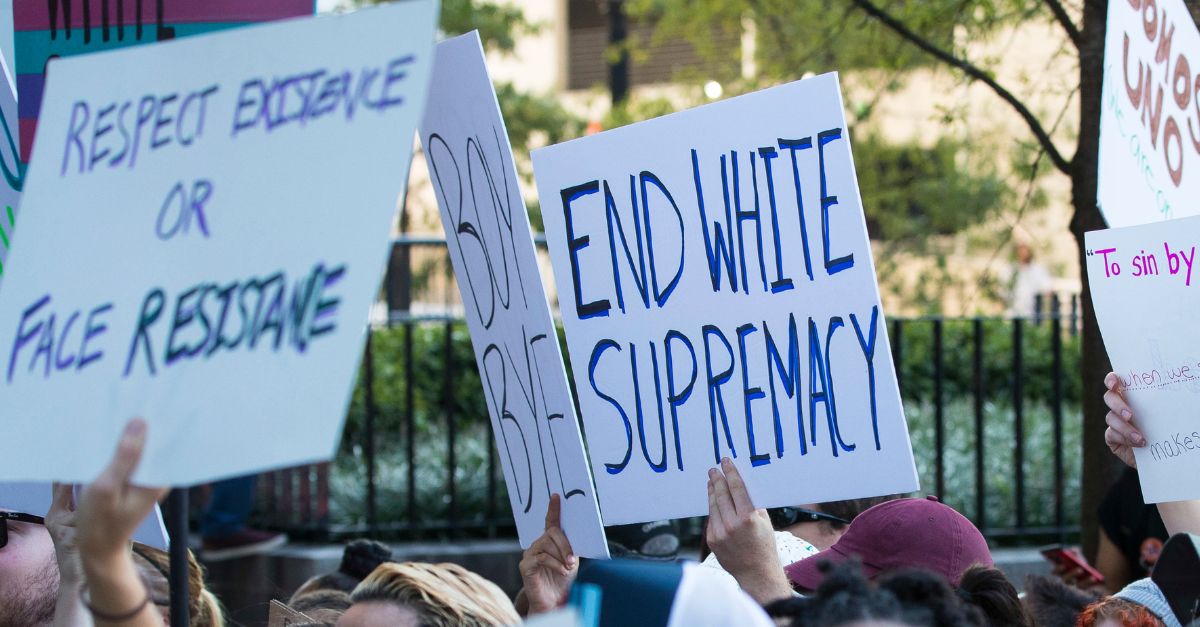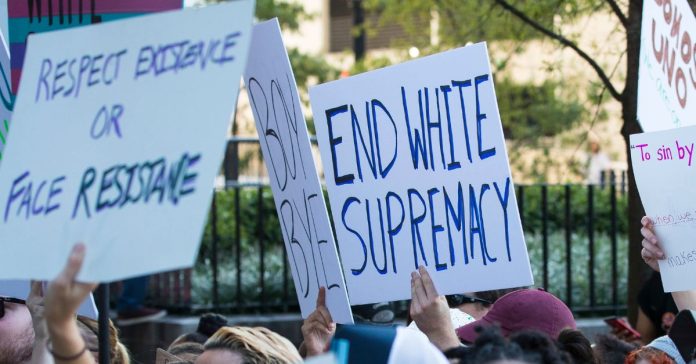
Anti-racism demonstrators participate in a rally that started in Centennial Olympic Park in Atlanta on Saturday, Aug. 19, 2017. (AP Photo/Todd Kirkland)
The Georgia Supreme Court ruled Wednesday to dismiss the defamation claims of a member of hate group Goyim Defense League who sued a business owner for responding to his “review bombing” with a post that called him a neo-Nazi and member of the KKK.
Valerie Millsaps and her husband own Wall to Wall Frames, Inc. & Artist Boutique, a custom framing shop in Cartersville, Georgia. Michael David Weaver, also known as Michael Carothers, is known to local police in Georgia as a self-proclaimed white supremacist. Weaver, a member of neo-Nazi group National Alliance, organized an antisemitic rally outside a Cobb County synagogue in 2023 and spent a year in prison for assaulting a Black man in 2010.
In June 2022, Millsaps drove past Weaver, who was standing on the street holding a sign with antisemitic messaging. Millsaps flipped him off by “display[ing] her middle finger.” Weaver next took things a step further and, since he had seen Millsaps’ business logo on the side of the van she was driving, posted on his personal blog asking followers to leave negative Google reviews of Millsaps’ business.
Weavers followers complied and within 12 hours, multiple negative reviews appeared on the frame shop’s review page. Weaver next thanked his supporters who had left the reviews and wrote, “I’m just getting warmed up! Total f—— war!”
Millsaps posted her own comment on her shop’s Google review page that said:
My business is being targeted by a Neo Nazi and a member of the KKK. Please disregard the reviews. None of those profiles have ever entered my shop. I am being harassed and bullied by Michael [Weaver]. A known felon of hate crimes. He has targeted many businesses in our town. I refuse to be intimidated by him and his hate literature that he has left at my shop and my home. He has threatened to kill other shop members and flooded their Google reviews with harassing, untrue reviews. You can decide to try my shop and let my experience speak. Please note all date stamps are in a concentrated period of time. I choose LOVE over HATE. Thank you kindly.
Millsaps said that after the negative reviews were posted, the shop’s Google rating plummeted and, as a result, business declined.
Weaver countered Millsaps’ lengthy comment with a libel lawsuit against the shop owner. She then filed a motion to dismiss Weaver’s complaint under Georgia’s anti-SLAPP statute. Named for “strategic litigation against public participation,” anti-SLAPP laws prohibit the filing of lawsuits that are strategically used to censor, intimidate or silence critics by imposing the threat of legal defense fees.
Millsaps told the court that even before the drive-by incident with Weaver, she already knew the man to be affiliated with white supremacists. She said that she knew Weaver to be a member of the neo-Nazi group National Alliance, which advocates “new societies throughout the White world which are based on Aryan values and are compatible with the Aryan nature.” She also said he has links to the World Church of the Creator, whose founder has called for “total war against the Jews and the rest of the goddamned mud races of the world[.]” Millsaps said that Weaver even co-founded a local white supremacist group and presented evidence that Weaver advertised his affiliations to local media.
Millsaps also said that her labeling Weaver “a known felon” had also been true. She said she knew the man had a “history of violent behavior,” including a conviction for pepper-spraying a Black man on the street, vandalizing a gym that kicked him out for posting antisemitic flyers, and threatening to kill the gym’s owner.
Weaver admitted in court filings that he engaged in “review bombing” Millsaps’ Google page, but denied that he ever threatened to kill anyone, that he was a member of the KKK, or that he had been convicted of a hate crime. Weaver was convicted in Columbus, Georgia, for the 2010 attack of a Black man he did not know. He served a year in prison on an aggravated assault charge for the incident.
After a hearing, the trial court found that not only were Millsaps’ statements a “matter of public concern,” but also that they were substantially true. The trial court also found that Weaver conceded that he was a public figure for purposes of defamation, thereby requiring the heightened standard of actual malice in order to recover.
Weaver appealed and argued that he had not really threatened to kill anyone. The Georgia Supreme Court, however, ruled that what mattered was not what Weaver had actually done, but what Millsaps thought he had done at the time she posted her comment. The court found that Millsaps thought what she posted was true, because she had heard that Weaver threatened to kill a local gym owner. The court noted that Weaver did not deny harassing or vandalizing the gym owner.
The court said that given the underlying context, Weaver’s known history, and the evidence presented, Weaver’s defamation case was not strong enough to survive a motion to dismiss.
Representatives for the parties did not immediately respond to request for comment.
Have a tip we should know? [email protected]

